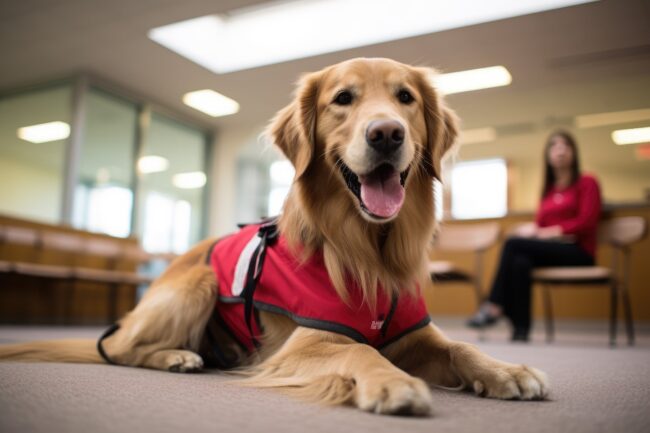In the city of Meriden, Connecticut, Officer Stephanie Masella has a unique partner—John, the police department’s first therapy dog. His role is as vital as it is heartwarming, helping children at crime scenes, comforting officers dealing with trauma, and engaging with the community through school programs and visits to elderly residents. Investigative reporter Jeff Derderian explains that John isn’t your typical police dog; his job is to bring comfort and healing where it’s most needed.
John’s journey to becoming a therapy dog wasn’t an ordinary one. Before joining the Meriden Police Department, John spent his early years in a maximum-security prison in New York, trained through a program called Puppies Behind Bars. This program pairs inmates with puppies, who they train to become service dogs for law enforcement, veterans, or individuals with disabilities. John was one of these lucky dogs, trained by an inmate named Jason from just eight weeks old until he was about a year and a half.
When Officer Masella first suggested the idea of a support dog for the department, Meriden police were fully on board. Lieutenant Hector Cardona expressed excitement about John’s future: “We’re gonna have him engaged with our schools, our kid programs, elderly programs—anything community-based, he will be there.” John’s presence goes beyond simply being a comforting figure. He bridges the gap between the police and the community, helping to build trust and bring smiles to faces everywhere he goes.
The Impact of Puppies Behind Bars
John’s story started in the Green Haven Correctional Facility, a maximum-security prison in New York. The Puppies Behind Bars program aims to give inmates a sense of purpose and responsibility while training dogs to assist others. The inmates take care of and train the puppies, preparing them for their roles as service dogs. For many of these inmates, this is the first time they’ve been around a dog in decades, sometimes 20 or 30 years.
Officer Masella remembers her time at Green Haven vividly. “We’re walking down these halls in this prison, ya know—these are not nice guys. There are 1,600 of them, and about 800 are doing life,” she recalls. Despite their backgrounds, the inmates put their hearts into training dogs like John, developing a special bond with them during the process. Officer Masella and the other officers were also trained by these inmates, learning how to work with the dogs in real-world scenarios.
The relationship between the inmates and the dogs is more than just functional; it’s emotional and rehabilitative. For the inmates, working with the dogs is an opportunity to give back to society in a meaningful way. The dogs become a symbol of hope and responsibility for those who have been incarcerated for many years. For John, his time at Green Haven prepared him to fulfill his critical role in Meriden’s community, bringing comfort and joy to people in times of need.
John’s Role in the Community
Since joining the Meriden Police Department, John has made a significant impact, particularly in his work with children and those affected by trauma. At crime scenes, especially ones involving children, John’s calming presence helps to soothe young minds in distress. His ability to sense whenne is in emotional pain makes him invaluable to the officers, who often witness traumatic events themselves.
One of John’s most poignant moments came after a local homicide. The younger sister of the victim was reluctant to attend the memorial service, overwhelmed by grief and fear. However, she changed her mind when she learned that John would be there. John’s presence gave her the courage to attend the service, illustrating the profound emotional support that a therapy dog can provide.
John also brings comfort to his fellow officers. Law enforcement personnel often face harrowing situations, witnessing violence, death, and other traumas as part of their daily duties. Having John around the department offers them a moment of reprieve, a reminder that they, too, need to take care of their mental health. “I see the smile he puts on people’s faces, and it brings me so much joy,” Officer Masella shares, reflecting on the bond she shares with her furry partner.
A New Kind of Policing
John’s work isn’t limited to crime scenes or police stations. He plays an active role in the community, participating in school programs and visiting nursing homes. By engaging with children, seniors, and vulnerable populations, John helps to foster positive relationships between the police and the community. His work is an example of how law enforcement can go beyond enforcement and protection to offer compassion and care.
The Meriden Police Department’s commitment to using therapy dogs like John represents a new approach to policing. It acknowledges the emotional toll that both officers and community members face and provides a solution that is as heartwarming as it is effective. By offering comfort in times of distress, John and dogs like him help to humanize the often tough and emotionally charged world of law enforcement.
John the therapy dog is more than just a pet—he’s a symbol of hope, comfort, and resilience for the Meriden Police Department and the community it serves. His journey from a maximum-security prison to the front lines of emotional support demonstrates the transformative power of programs like Puppies Behind Bars and highlights the important role therapy dogs can play in law enforcement. As Officer Masella and John continue their work, it’s clear that this special partnership is making a lasting difference in the lives of those they touch.
